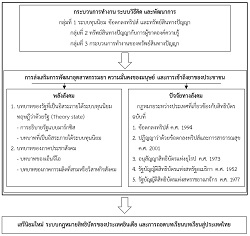NEOLIBERALISM AND INTELLECTUAL PROPERTY REGIME IN INDIA: A CASE STUDY OF PATENT LAW IN INDIA AND LESSONS LEARNED TOWARD THAILAND
DOI:
https://doi.org/10.14456/nrru-rdi.2020.64Keywords:
Neoliberalism, Intellectual property, The TRIPs agreement, India’s patent law, Lessons learned toward ThailandAbstract
This research aims to analyze 1) a process of neoliberal ideology affecting India’s intellectual property and its international trade; 2) a notion of India’s patent regime affecting India’s pharmaceutical development; and 3) social forces and social factors regarding to India’s patent law that led to a people’s access to medicines and an exportation of generic drugs. This study employs a qualitative research methodology by collecting data from four sources: primary and secondary sources; informal interview from 7 key-informants; and focus group from Department of Intellectual Property, Ministry of Commerce with using a content analysis.
The research finds that the neoliberal ideology has been transforming intellectual property to become a tool of global capitalism in transforming a patent protection as part of international trade. The emergence of “TRIPs-plus Agreement” has standardized a patent protection which is far higher that the TRIPs Agreement of the WTO. However, India has succeeded in protecting social interests via the role of Indian government in sustaining an implementation of the 1970 Patent Act. Although the Indian patent law was obliged to amend abiding the WTO requirement in 2000, social protections remain persisted. Moreover, India has had strong civil societies in mobilizing mass for an access to medicines as well as the roles of local private sectors in working with civil societies. By and large, India’s experience can be drawn for lessons learned toward Thailand.
References
Balasubramaniam, K. (2003). “Access to Medicines and Public Policy Safeguards under TRIPS”. Bellmann, C., Dutfield, G., & Melendez-Ortiz, R. Eds. Trading in Knowledge: Development Perspectives on TRIPS, Trade and Sustainability. London : Earthscan.
Block, F. (1987). Revising State Theory: Essays in Politics and Postindustrialism. Philadelphia : Temple University Press.
Block, F. (2003). “Karl Polanyi and the writing of The Great Transformation”. Theory and Society, 32, 275-306.
Block, F., & Somers, M. (1984). “Beyond the Economistic Fallacy: The Holistic Social Science of Karl Polanyi”. Skocpol, T. Ed. Vision and Method in Historical Sociology. Cambridge and New York : Cambridge University Press.
Chaipinit, C., & May, C. (2010). “The Polanyian Perspective in the Era of Neoliberalism: The Protection of Global Intellectual Property Rights”. Journal of Population and Social Studies, 19(1), 99-122.
Chaipinit, C., & Somboon, V. (2011). “Human Security in Intellectual Property Rights: A Case Study of Thailand’s Patent Policy”. Journal of Politics, Administrations, and Law, 3(2), 47-95.
Chaudhuri, S. (2005). The WTO and India’s Pharmaceuticals Industry: Patent Protection, TRIPS, and Developing Countries. New Delhi : Oxford University Press.
European Patent Office. (1973). European Patent Convention 1973. Retrieved December 15, 2019, from https://www.epo.org/law-practice/legal-texts/html/epc/1973/e/ma1.html
Hay, C. (2006). “What’s Marxist about) Marxist State Theory?”. Hay, C., Lister, M., and Marsh, D. Eds. In The State: Theories and Issues. New York : Palgrave Macmillan.
India Brand Equity Foundation. (2018, 11 December). Senior Manager at Knowledge Center. Interview.
Indian Drug Manufacturers’ Association. (n.d.). About IDMA. Retrieved December 10, 2019, from https://www.idma-assn.org/about-idma.html
Indian Patent Office. (2018, 14 December). Senior Joint Controller of Patents & Designs. Interview.
Kaldor, M. (2003). Global Civil Society: An Answer to War. Cambridge : Polity Press.
Kuanpoth, J. (2005). “Current Development and Trends in Intellectual Property Rights: Hamonisation through Free Trade Agreements”. FTA Watch Coalition. Free Trade Agreements: Impact in Thailand. Bangkok : FTA Watch.
Limmanee, A. (2015). State, Society, and Changes: A Consideration on Power, Policies, and Relation Network (2nded). Bangkok : Siam Paritas. (In Thai)
Martinez, E., & Garcia, A. (1996). What is Neoliberalism?: A Brief Definition For Activists. Retrieved September 19, 2019, from http://www.corpwatch.org/article.php?id=376
May, C. (2007). The World Intellectual Property Organization: Resurgence and the Development Agenda. New York : Routledge.
Munck, R. (2002). Globalisation and Labour: The New ‘Great Transformation’. London : Zed Books.
Munck, R. (2006). “Globalization and Contestation: A Polanyian Problematic”. Globalizations, 3(2), 175-186.
Office of the Controller General of Patents, Designs and Trademarks, Department of Industrial Policy and Promotion, Ministry of Commerce and Industry. (n.d.). History of Indian Patent System. Retrieved January 9, 2019, from http://www.ipindia.nic.in/history-of-indian-patent-system.html
Organisation of Pharmaceutical Producers of India. (n.d.). Who are we?. Retrieved December 10, 2019, from https://www.indiaoppi.com/who-we-arePharmaceutical Research and Manufacturers of America. (n.d.) Members. Retrieved January 10, 2019, from https://www.phrma.org/about/members
Pinto, A. (2014). From Democratic Socialism to Neo-Liberalism: The Story of India’s Democracy. Shimla : Indian Institute of Advanced Study.
Shiva, V. (2018, 10 December). Activist. Interview.
Sun Pharmaceutical Industries Ltd. (2018, 14 December). Senior Vice President and Corporate Relations. Interview.
United Kingdom Intellectual Property Office. (2017). The Patents Act 1977. Retrieved December 15, 2019, from https://assets.publishing.service.gov.uk/government/uploads/system/uploads/attachment_data/file/647792/Consolidated_Patents_Act_1977_-_1_October_2017.pdf
United States Patent and Trademark Office. (1952). United States Code Title 35-Patent. Retrieved December 15, 2019, from https://www.wipo.int/edocs/lexdocs/laws/en/us/us176en.pdf
Watal, J. (2014). Intellectual Property Rights in the WTO and Developing Countries (6thed). New Delhi : Oxford University Press.
Wood, E. (2003). Empire of Capital. London : Verso.
World Trade Organization. (1994). Trade-Related Aspects of Intellectual Property Rights. Retrieved December 15, 2019, from https://www.wto.org/english/docs_e/legal_e/27-trips_01_e.htm
World Trade Organization. (2001). Declaration on the TRIPS Agreement and Public Health. Retrieved December 18, 2019, from https://www.wto.org/english/thewto_e/minist_e/min01_e/mindecl _trips_e.htm





